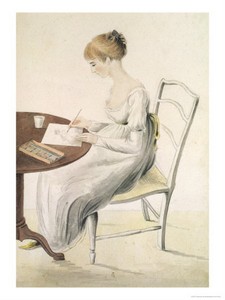
Fanny Austen Knight, later Lady Knatchbull
Dear friends and readers,
Last week most unexpectedly (to me) Austen’s fifth letter to her then novel-writing niece, Anna Austen, the third long one on Anna’s novel, Which is the Heroine (see Letters 103, and 104), and the fourth on novel-writing strictly from Austen’s point of view (the first a satire on a novel the two had read together, Letter 76), erupted in controversy. It was insisted that Austen felt a barely-disguised weary irritated contempt for it; to be fair most people on the Janeite list-serv seemed to feel that Austen took her niece’s efforts seriously, read the novel with care and sent earnest practical criticism shaped by her egoistic satisfaction in seeing her conscious method and idea of how novels should be written closely imitated — as I had without much considering (I admit) how precisely Austen rated her niece’s effort (I had not thought this mattered) or that often Austen is very harsh, mocking towards many other novel writers especially when they depart from a passionately held-to literal verisimilitude and carefully understated style (maybe she came to the erroneous conclusion that Eaton Stannard Barrett’s The Heroine was “in the style of” Radcliffe because he wrote in a ludicrously extravagant style).
Equally unexpectedly (then) Austen’s letter to Fanny in response to one by Fanny asking her for advice on whether to marry John Plumptre or not, one which led Austen to reveal the basic ways she thinks about love, marriage, sex, was passed over without much intense concern. People disagreed on this but it did not arouse as much concern as Austen on a novel.
Thinking about it now, I realize it does make sense that anyone who devotes themselves to Austen’s novels and rates them super-highly would care intensely about her attitude towards her work vis-a-vis others. And I’ll say this if Diana Birchall is right and Austen’s “criticisms are really devastating and her attempts to soften don’t remove the sting,” then that’s in line with the way in her letters (and sometimes in the novels) she treats many great and good writers, including Anne Radcliffe, Robert Southey, Robert Burns, Mary Brunton. She resents them as rivals; I don’t think she sees her niece as a rival, but it could be she is reacting in the same possessive way. She reacts in an intensely possessive way as an author partly because her success has come after so many years of failure to publish, and then the truth of her era is she would not be particularly respected for such novels by the average person (who she was surrounded by). Not that Anna is among the great and good, but this is a sort of rivalry within the family. Anna asserts herself in other ways that grate intensely on her aunt; why not this? Maybe for all her wealth, the dullard Fanny was much less a threat. (But then when Anna became this downtrodden calving cow, the threat was gone and pity re-emerges.)
Against this is the extravagant praise she heaps on her nephew’s one attempt at writing a novel: there I suspect the favoritism comes from his being a male.
Since I have already written at length on Letters 107 and 108 (the one causing the controversy), I think it best for these first to refer to the blogs which contain the texts and a hard-worked effort to surmize not what the story was about, significance of the characters or its themes (the first Austen never mentions and the second she seems as oblivious to as she does to themes in anything she writes of), but just those elements which parallel those in Austen’s own work which are what capture her attention, as two contrasting heroines, a dominating aristocratic lady, ambiguous hero, courtship, women’s friendships. And second to add a few more thoughts I wrote in response to what others wrote about this in media res reading of Anna’s novel by her aunt. For letter 109 I’ll revert to the method I’ve been using lately: reprint the text (except since it is so long I shall put it in the comments so as not to make an over-long), and present a reading, with links to the readings of others on Austen-l
************************
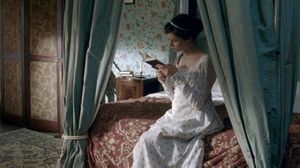
Catherine Morland (Felicity Jones), novel reader (2007 Northanger Abbey, scripted Andrew Davies)
Austen to Anna Lefroy, Letter 107, 9-18, Sept 1813
On this one Diana was not sure how Austen was rating the novel:
This is another of Austen’s rare lit-crit letters to Anna, that sheds just a little light on her own methods and thoughts about writing. The trouble is her usual ironic polite disingenuousness. I really think it’s a case of our not knowing her in person, as her correspondents did (and how could we?). That’s why so often, even after years studying her, it’s so hard to tell if she means something or not. She is a riddle, quite a riddle. As Henry Crawford said about Fanny: I do not quite know what to make of Miss Fanny. I do not understand her. I could not tell what she would be at yesterday. What is her character? Is she solemn? Is she queer?”
Yes, well. To proceed. Here she is telling Anna that she has been “very much amused” by her books but has “a good many criticisms to make – more than you will like.” Contradictory. How “amused” was Jane Austen really by Anna’s work? How good did she really think it was?
We can’t even tell for sure if she thought it deserved the compliment of constructive criticism, or if she was merely being tactful with her emotionally fragile niece. But, whichever the case, she plunges right in, subjecting the manuscript to strictures and procedures she uses for her own. See the rest from Austen-l archives, Wed, July 3rd
I had in my reading of Austen’s letter concentrates on the values Austen was imposing on the niece’s fiction — as she does on all the novels she reads; this determination to avoid the concrete is there all right, not too many particulars, the incessant concern over rank, you must have seen or experienced something for real to write about it, her way of calling “delightful” what is probably a scene of bullying and social misery, her idea of fiction as somehow simply fun and conscious looking at it as comic. Diana looks to how Austen rates the book.
So she and I are basically more or less in agreement except I think Austen likes Anna’s novel far more than Diana allows. Basically because this is a long letter on which Austen has spent much time. It is far more coherent than the usual, far less associative. She has spent days reading Anna’s novel as the dates show. I agree that a lot of Austen’s language here is so general, but this is typical of her.
She is in fact more specific here (and following comments in Letter 108) than she will be again until Edward Austen-Leigh sends her his work. I suggest in my blog that these general rules were enough to control her own work, but do not explain the deeper content of it at all. I would suggest that she likes Anna’s novel because she likes her own: she is utterly partisan in most of her responses to other novels.
For Anna, beyond the deep pleasure of writing a long novel – which took time, time she had as she was not permitted much of a social life — she is pleasing this aunt who had been a sort of half-mother to her until she Anna began to grow up, went into puberty, and the aunt sided with the family against Anna’s choices of mate. One can see one place earlier where Austen instead
of feeling for the girl for having such a small dance to go to sniffs at it and says she went to far bigger ones. Anna roused her jealousy as Fanny did not; the smarter girl more of a threat? Fanny had more prestige as a rich man’s daughter too. But Anna is trying hard and we see that unlike the previous joint letter where it was suggested she, Anna, need not come over, now they want her company.
Diana slides over the cold dismissive way Austen treats her sister-in-law’s death in childbirth — the idea she’s sparing the grandmother won’t wash here as the grandmother need not read the letter and as written is more interested in the shoes she has made Anna than her daughter-in-law’s probably awful death.
************************
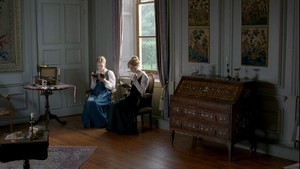
Emma (Romola Garai) and Harriet (Louise Dylan) engaged in serious reading (2009 Emma, scripted Sandy Welch)
Austen to Anna Lefroy, Letter 108, 28 Sept 1814
Here are all Diana’s central postings (Austen-l archives, July 11th, July 12th, July 19th).
What insights can we find from this disagreement — or what is common ground. I agree that in her letters to the nieces and nephews there is something awry sometimes and again at other times a wild creepiness. I see the latter in some of her letters to Fanny — especially when later in London Austen seems to be in competition with her, yes as another girl, yet the woman is in her later 30s. She giggles as if she were 13 — it’s embarrassing and to me underlying this is her virgin state, how she has been by her family kept from normal sexual experience because she refused to marry and only by heterosexual marriage they approved of would they allow her to grow up, find independence, mature. In another famous letter to Fanny where she gloats over Fanny’s divagations, there is a coolness and distance that is alienating, something vampirish as she devours up what she sees for her fiction. With Anna I see less of this — many of the letters to Anna are missing (as to Fanny — at least 25 we know of to Fanny were destroyed), but that the close relationship of the early years was suddenly turned off and Austen wrote hostile poems and hurt the girl is what I’m referring to. The girl is writing this fiction in order to find someone who loves her again.
But in this letter I see practical criticism. Austen is entering into Anna’s fiction as if it were her own. I don’t see her pulling her punches, but really meaning what she’s saying, fully engaged in the novel because the technique and outlook is so close to her own. I don’t see a subtext of “I really think this stuff is awful at all.” There’s no sign of it — and the criticism about Anna’s phraseology or her lack of class distinctions and trying to write what she had not experienced (say Ireland) are genuine without trashing at all. Austen”s mockery of other novelists comes from these few principles (really they are literal guidelines in her mind) but she lets them have it.
Each and every comment Diana stated she then elaborated in such a way as to overstate it and re-paraphrase to become damning. In the original letters they are not damning criticisms at all but small suggestions for change; Anna going in right direction, has the essentials but now needs to revise — like Aunt Jane did — and for 30 years in some cases. The good things are as many as the suggestions for improvement and in some of them she gets enthusiastic (like Anna getting the 3-4 families together in a village), though I admit all of these are without exception where she is in effect praising her own impulses.
And I reiterate: there is not an iota of tone of contempt in the letter. To the contrary, there is thorough sincere examination.
What don’t I recognize two things. Austen is a hired editor who reads typescripts for a living, a weary person at night after years of doing this for a living with yet another typescript she has to be polite about. Unlike many another great author, she was not besieged with manuscripts at all. The analogy is utterly false. What Diana is doing is transferring her reaction to what she supposes the manuscript was to Austen, and I suggest this is part of a long tradition of separating Austen off from her relatives. It’s ultimately a hagiography move.
I don’t think there’s all this distinction of academic versus non-academic critiquing. Critiquing is critiquing; I’ve been sent some of these sequels too. A couple I did like a lot but most I’ve thought feeble, absurd or (paradoxically) the ones which have made a lot of money embodying some of the worst values of US life for girls. False history too; they think their idealized Austenland actually had some existence: when Austen leaves out sex or abrasive and violence, a sequel writer seems to think her milieu was without it. They need to read Burney’s diaries or diaries of others.
It’s not an unimportant point because — as Claire Harman does in her book — I feel her family did not see all that distinction between her work and that of others, including themselves. While she might herself — and I think inside herself must have known — she had genius of the type we see in other novelists of the era whose work is still read and living for real, she was not sure, could not be sure as she had no one to validate this. The remarks she gathered are pathetic for the most part, few seem to have any understanding of her achievement. Nothing like Scott or the couple of critics of the 1820s (on Persuasion and NA); We must wait for mid-19th century and critics like GH Lewes for any full recognition to start. She really did live and die in a backwater like that her nephew was in later in the century. Henry once invited her out of it, but like himself (we see that in a letter after Eliza’s death) she was not keen on enduring the sense of her lower place and being made uncomfortable to reach such people. It was not worth it she must’ve felt. It could not go anywhere in her world unless she would break from her life’s patterns and she deliberately dressed in a way that announced to the world she would not.
And the supposed difference between genres is wrong-headed and over-rated. Works of genius emerge from literary criticism, history, anthropology and all types of writing as much as they do from novels just as many many novels are trash with the author semi-unaware of what he or she has done and many of these other genres include false and stupid and self-serving works of all sorts. Genre division is over-rated as is the word novel. People keep to this the way they keep to other obvious handles to allow them to make judgements.
Diana is just like all of us, as likely as all to perform transference, and her devotion to Austen as personally rooted as any of us. I am not misconstruing Anna’s circumstances. Indeed I have a tendency here as I do for all of them except the rich ones to see the darker sides of the case. In Anna’s case there seems to have been nothing, nothing Austen had in her power really to help this niece. Anna had only the limited choices of a dowry-less stepdaughter and these in effect destroyed any chance of real happiness or fulfillment for herself. Helping her would be to help her out of the situation and Austen did not do that for herself. Austen felt for her when she saw the endless pregnancies and destruction of Anna’s body begin. (From a stark standpoint the early death of the husband put a stop to that but then it took from her her home and all decent income.)
Anna did get some satisfactions in life of course: the daughters, especially Fanny Caroline (the one who didn’t marry and who later defended her against Austen;’ there seems to have been real support and companionship between the. Another, I assume her one novel left which is readable (Mary Hamilton). In his discreet way her brother, JEAL tell us she lived a penurious and dependent (his words) or (mine) necessarily sycophantic life living with and on the charity of others. It mattered to Anna in the immediate sense that her aunt treat her efforts with respect and real interest and Austen did that for her, but she did not back it up by supporting her desires for small fullfilments after marriage (eg. the piano). But what could that do for her really once she married? Nothing. She was a goner. I don’t think I’m doing anything at all for this long dead thwarted woman by showing the aunt didn’t treat her book with contempt. Both now long rotted in their graves. The idea that Austen’s praise of this book is compensating for what Anna’s life was to me is absurd. What do I care about Anna? her later novelettes show her to have turned into these narrow minded religious types late in life; understandable I suppose but that’s the best I can say of that.
************************
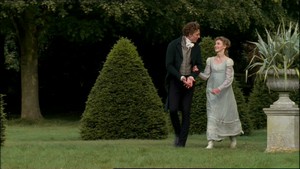
Fanny Knight (Imogen Poots) and John Plumptre (Tom Hiddleston) in a happy courting moment (2009 Miss Austen Regrets, scripted Gwyneth Hughes)
Austen to Fanny Austen Knight, Fri-Sun 18-20 November 1814
Again her is Diana’s (July 16th, Austen-l archives); Diane Reynolds thought the letter satiric (July 18th, Austen-l archives)
I’ve read both Diane and Diana’s responses and while the obvious thing to say is how differently we do read these letters sometimes, since here and there I agree with a specific paraphrase (more often Diana’s), and in this case feel confident I am accurate about the source and nature of Austen’s talk about love and marriage, my response to their readings is they need to read Sir Charles Grandison.
This kind of thinking is typical of letters in the era and whenever the young prospective girl is being talked at, talked to, and responding to the question of who to marry. It’s found in the letters of Dorothy Osborne (later 17th century) responding to someone about courtship; it’s everywhere in the French literature of the later 17th century (the heroic romances); you can find it in the didactic books (Madame de Genlis has examples; Madame d’Epinay). Didactic courtship letters
Austen’s circular reasoning, this (what seems to us) faux prudential back-and-forth, with a seeming ratiocination over the exact state of Fanny’s heart is just what Richardson has Harriet’s interlocutors write to her about her love for Grandison and what Harriet writes to Charlotte Grandison, an Emily in the household, Lucy Selby. They interrogate and switch back and forth with the same kind of de-sexed tone. This kind of talk was not gibberish to young middle class women at the time; no wild mockery.
One reason for Austen’s hesitations is she is afraid her niece will take her advice, that her advice is no good since it reflects Austen’s own feelings, and since Fanny is by no means really truthful with herself (and so cannot be with the aunt). Austen herself in the visit we saw Fanny and she make to Henry favored John Plumptre (she was much happier when he turned up for a visit immediately than Fanny was) and she favors him still: she speaks of his qualifications as near angelic (so half-comic at that point), but she’s serious: here’s this intelligent, moral, kindly young man in love with Fanny, his religion one the family approves her and he stands to inherit. Fanny has hit the jackpot and this is not likely again.
Only, as the letter implies, Fanny does not like this intelligent earnest young man; she prefers the idle brothers, trivia and wit. Fanny is bored, and would like the manly type 18th century words labelled “a blusterer” and we might call aggressive. So even if from a prudential. moral, and companionate standpoint, he’s an ideal candidate, Fanny had better not marry him since she feels no affection. The never marry without affection echoes a similar statement by Jane Bennet to Elizabeth when Elizabeth finally tells Jane Mr Darcy has asked Elizabeth to marry him and she has said yes. You must love him to spend your life with him, including bearing his children and obeying him, living within his circle. It’s an idealistic criteria: P&P is a romance so Jane is not prudential; Fanny herself is an heiress so she needs not worry to marry for money.
Perhaps what seems so out of whack to modern readers is the seriousness with which Austen treats this case: writing carefully, not associatively, making her sentences coherent, writing at length too. We don’t treat young girls’ love this solemnly. But then young girls’ lives have so much more to choose from beyond marriage and marriage is not the limiting condition now that it was then.
Why have we not heard this tone before? First, it’s the first real letter to Fanny. The one written in 1806 and sent to Fanny as from Fanny is a poem meant for Francis’s eyes upon the occasion of his wedding.
Some particulars (a closer reading) of this first part of the letter.
The opening sentence shows her reluctance to write — she would really rather not. She does not think Fanny will listen to her – Fanny has just written a giddy letter (so I surmise) saying that she realizes she is not in love with Plumptre and and so thinks there must have been a change in her feelings. Austen suggests that Fanny was terribly mistaken to think she was in love with Plumptre in the first place; here’s where the book sounds so Harriet Byron: “with all my heart I wish I had cautioned you on that point when first you spoke to me; — but tho’ I did not think you then so much in love as you thought yourself, I did consider you as being attached to a degree.” Now Austen sees Fanny never cared for Plumptre, and now “you certainly are not at all. ”
She observes that Fanny has grown disgusted because Plumptre has shown he likes Fanny so much. “Your being secure of hmi .. had made you indifferent.” She doesn’t value someone who overvalues her — this kind of despising of people who are too open and vulnerable is unfortunately common.
Still Austen is surprised that Fanny’s change of heart – that made her face she doesn’t care for him — should be that great. Austen says she can’t account for it beyond that. She says she is glad that Cassandra was dining at the other house when Fanny’s letter arrived or she would have had to maneuver to keep the letter from Cassandra. The implication is Cassandra would not have liked what she saw in this letter: Fanny’s open change of heart. Austen speaks of her curiosity and concern in reading it. I infer the family would have liked Fanny to marry Plumptre and will regard her perhaps as jilting him (and jilting we see, as in Anna Lefroy’s case, any kind of “giddiness” is not approved of) Austen can account for why she loved: Plumptre was the first to address her with love. That was the charm. (This reminds me of the explanation for why Henry Tilney loved Catherine at first). It’s then that Austen says and if she did, nothing to be ashamed of and launches into a kind of over-the-top panegyric on Plumptre: she’d have to go far to find another man who fit the kind of criteria. She is serious about liking his religiosity, manners, heart. “Think of all this, Fanny.” His only fault is modesty.
Fanny’s moving away from Plumptre because he’s not a blusterer, domineering shows a conventional wanting for the so-called manly masterly type. Austen is not keen on this type — we should not be surprised at this: the heroes she invents to win her heroines include Edward Ferrars, Edmund Bertram — quiet, modest, earnest types. Mr Knightley is this way too — more determined to teach Emma but no wit, plain in his ways, grave even.
She then acknowledges Plumptre may be hurt. He has been led to think Fanny does love him and they will marry. Austen says he’ll get over it thought: she doesn’t believe such Disappointments kill. Apparently Fanny sent some kind of hint in the form of a musical device. Again Austen is glad that Cassandra is out of this loop.
She then turns the subject to Anna, though still on love and marriage. Anna newly married; her dislike of any “parade” of happiness feels to be jealousy here, a kind of resentment. Diana talks of Austen feeling towards both nieces: ” human regret, envy, a soupcon of spite”. I’ve not seen any spite towards Fanny as yet. The next sentence sounds priggish: “I have often known young married Women write in a way I did not like … ” I take it they alluded to have sex, being sexually knowing and this embarrassed and grated on Austen.
I will go on to the end of the letter as there’s not much left. The paragraph on the 2nd edition of MP contains no hidden sneer towards Fanny. It’s simply true that Fanny does not care about money; she’s above it — we see this acknowledged implicitly in Austen’s advice to her about marriage: Fanny can afford to say no to an heir. But Austen does care. There is a dig at Fanny liking the pleasures of vanity but since it’s said so straight-forwardly it seems to me Fanny is assumed not to be ashamed of pleasing her vanity — which refers to Fanny liking to be admired. Austen likes praise too – she says she does receive praise for her work through indirect channels and Fanny will enter into that. Here there’s a slight self-mock: “I have written [Henry] my Will and pleasure … ” She is unused to being consulted as to her preferences, but since it is her book she is treated that way by Henry.
The last paragraph is a resume of visits, who visiting who and where. Fanny’s father and brother are staying with Francis and Mary Austen. On Sunday a woman that we’ve seen Edward favored a bit he is writing to: Louisa Bridges. He’s invited her and Cassandra and she too to dinner at Chawton house (the great house). Miss Lloyd appears to be someone in the next generation of the Craven family, a friend to Fanny who plays the harp. Miss Hare is a milliner.
The PS. shows Austen feeling an observing writer’s delight on viewing Fanny’s attempt to whip some feeling up for Plumptre. How the value of things for her is that she can use them in writing (a woman after my own heart). Since Austen herself didn’t experience this for herself, she experiences it vicariously as a writer. Fanny’s absurdity here “ought to be in print. Much too good to be lost.” Now that is Emma Woodhouse’s tone about Harriet Smith.
But the tone switches: Austen did like Fanny Cage — as did Edward.
************************
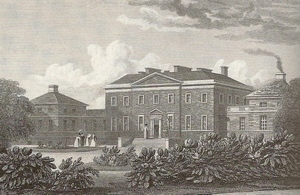
Mersham Le Hatch, the estate home of Sir Edward Knatchbull (1825) into which Fanny Austen Knight moved
The reader who bothers to read through this material and today’s readers’ commentary will have gone and considered a partial (many letters were destroy) record of Austen’s attitude towards novel writing and her relationship with two nieces: Anna, who had loved her as a substitute mother, and is expending enormous energy writing a novel in imitation of hers; Fanny, who has been encouraged to find in Austen an aunt-as-friend and thinks she is looking to her for what she has been encouraged to regard as the most important relationship of her life.
The tone of Austen’s letter to Fanny registers how important the girls’ choice is to the rest of her life. She can’t divorce; he can beat her; she’ll be endlessly pregnant, immersed in a new family group. The vacuity or oddity of the language comes from the refusal to acknowledge openly the strong sexual element that’s involved. As to money, most of the time there is little hypocrisy. But it’s talked about briefly and usually half-hypocritically, the full weight of the person’s status, connections, amount of land and money not really admitted.
The lacunae, the hypocrisies allow the people writing and talking to evade truths. In the case of Frances Burney D’Ablay when she and Susan talk about say Cambridge it’s never openly admitted how very far above Frances in status he is. It’s alluded to; it’s even obvious, but never said with its full weight. That happens again and again as Frances refuses to recognize what a low status person she is and how unlikely it is the men she wants until she meet D’Ablay will consider her. Remember Mr Knightley’s advice to Emma on Mr Elton’s ultimate choice: and in the event he had no status but he could command money and Miss Hawkins brought a good dowry.
Fanny Austen Knight need not worry over money so it’s not mentioned much. But in the event she married an older man landowner very rich — whom she may have loved. That she did that, makes me suspect that Austen does not see how much money does mean to Fanny. And that Fanny would not at all be impressed with the few hundred pounds Austen is making. Fanny does not respect is little bits of money such as novel writing procures. Fanny respects serious money and a highly respectable married woman lifestyle and that Jane has no chance of since she rejected Bigg-Wither and Edward Bridges. Fanny married an older man with many children; I suggest that Fanny would have married Harris Bigg-Wither.
Anna married to escape her stepmother and (depressed) father. She married partly for love a young man as grave and idealistic as she. She knew that she could never make enough money to support herself and thus her novel would be no help in that direction; she probably never thought of it that way, and again that she didn’t does suggest to us (though not her) she was not a serious writer because we just seriousness, success & failure by how much you make a money-making career out of it.
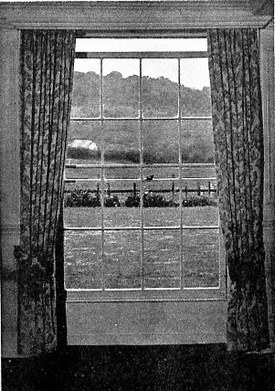
Ground floor window at Wyards, where Anna Austen Lefroy lived when she first married Ben Lefroy
Ellen

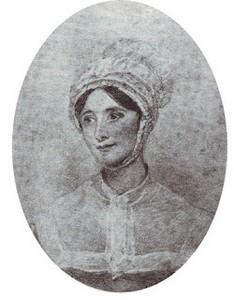
109. To Fanny Knight. Friday 18 – Sunday 20 November 1814. Chawton Nov: 18 — Friday.
I feel quite as doubtful as you could be my dearest Fanny as to when my Letter may be finished, for I can command very little quiet time at present, but yet I must begin, for I know you will be glad to hear as soon as possible, & I really am impatient myself to be writing something on so very interesting a subject, though I have no hope of writing anything to the purpose. — I shall do very little more I dare say than say over again, what you have said before.
— I was certainly a good deal surprised at first — as I had no suspicion of any change in your feelings, and I have no scruple in saying that you cannot be in Love. My dear Fanny; I am ready to laugh at the idea — and yet it is no laughing matter to have had you so mistaken as to your own feelings — And with all my heart I wish I had cautioned you on that point when first you spoke to me; — but tho’ I did not think you then so much in love as you thought yourself, I did consider you as being attached in a degree — quite sufficiently for happiness, as I had no doubt it would increase with opportunity. — And from the time of our being in London together, I thought you really very much in love — But you certainly are not at all-there is no concealing it. — What strange creatures we are! — It seems as if your being secure of him (as you say yourself) had made you Indifferent. — There was a little disgust I suspect, at the Races — & I do not wonder at it. His expressions then would not do for one who had rather more Acuteness, Penetration & Taste, than Love, which was your case.
And yet, after all, I am surprised that the change in your feelings should be so great. — He is, just what he ever was, only more evidently & uniformly devoted to you. This is all the difference.-How shall we account for it? — My dearest Fanny, I am writing what will not be of the smallest use to you. I am feeling differently every moment, & shall not be able to suggest a single thing that can assist your Mind. — I could lament in one sentence & laugh in the next, but as to Opinion or Counsel I am sure none will be omitted] extracted worth having from this Letter. — I read yours through the very evening I received it — getting away by myself — I could not bear to leave off, when I had once begun. — I was full of curiosity & concern. Luckily Your Aunt C. dined at the other house, therefore I had not to manoeuvre away from her; -& as to anybody else, I do not care. —
Poor dear Mr Plumptre — 0h! dear Fanny; Your mistake has been one that thousands of women fall into. He was the first young Man who attached himself to you. That was the charm, & most powerful it is. — Among the multitudes however that make the same mistake with Yourself, there can be few indeed who have so little reason to regret it; — his Character & his attachment leave you nothing to be ashamed of. — Upon the whole, what is to be done? You certainly have encouraged him to such a point as to make him feel almost secure of you — you have no inclination for any other person — His situation in life, family, friends, & above all his Character — his uncommonly amiable mind, strict principles, just notions, good habits — all that you know so well how to value, All that really is of the first importance — everything of this nature pleads his cause most strongly. — You have no doubt of his having superior Abilities — he has proved it at the University — he is I dare say such a Scholar as your agreable, idle Brothers would ill bear a comparison with. — Oh! my dear Fanny, the more I write about him, the warmer my feelings become, the more strongly I feel the sterling worth of such a young Man & the desirableness of your growing in love with him again. I recommend this most thoroughly. —
There are such beings in the World perhaps, one in a Thousand, as the Creature You & I should think perfection, where Grace & Spirit are united to Worth, where the Manners are equal to the Heart & Understanding, but such a person may not come in your way, or if he does, he may not be the eldest son of a Man of Fortune, the Brother of your particular friend, & belonging to your own County. —
Think of all this Fanny. Mr John Plumptre has advantages which do not often meet in one person. His only fault indeed seems Modesty. If he were less modest, he would be more agreable, speak louder & look Impudenter; — and is not it a fine Character, of which Modesty is the only defect?-I have no doubt that he will get more lively & more like yourselves as he is more with you; — he will catch your ways if he belongs to you.
And as to there being any objection from his Goodness, from the danger of his becoming even Evangelical, I cannot admit that. I am by no means convinced that we ought not all to be Evangelicals, & am at least persuaded that they who are so from Reason & Feeling, must be happiest & safest. — Do not be frightened from the connection by your Brothers having most wit. Wisdom is better than Wit, & in the long run will certainly have the laugh on her side; & don’t be frightened by the idea of his acting more strictly up to the precepts of the New Testament than others. —
And now, my dear Fanny, having written so much on one side of the question, I shall turn round & entreat you not to commit yourself farther, & not to think of accepting him unless you really do like him. Anything is to be preferred or endured rather than marrying without Affection; and if his deficiencies of Manner &c &c strike you more than all his good qualities, if you continue to think strongly of them, give him up at once. — Things are now in such a state, that you must resolve upon one or the other, either to allow him to go on as he has done, or whenever you are together behave with a coldness which may convince him that he has been deceiving himself. —
I have no doubt of his suffering a good deal for a time, a great deal, when he feels that he must give you up; — but it is no creed of mine, as you must be well aware, that such sort of Disappointments kill anybody. — Your sending the Music was an admirable device, it made everything easy, & I do not know how I could have accounted for the parcel otherwise; for tho’ your dear Papa most conscientiously hunted about till he found me alone in the Dining-parlour; Your Aunt C. had seen that he had a parcel to deliver. — As it was however, I do not think anything was suspected. —
We have heard nothing fresh from Anna. I trust she is very comfortable in her new home. Her Letters have been very sensible & satisfactory, with no parade of happiness, which I liked them the better for. — I have often known young married Women write in a way I did not like, in that respect.
You will be glad to hear that the first Edition of M.P. is all sold.-
Your Uncle Henry is rather wanting me to come to Town, to settle about a 2nd Edition — but as I could not very conveniently leave home now, I have written him my Will & pleasure, & unless he still urges it, shall not go. — I am very greedy & want to make the most of it; — but as you are much above caring about money, I shall not plague you with any particulars. — The pleasures of Vanity are more within your comprehension, & you will enter into mine, at receiving the praise which every now & then comes to me, through some channel or other. —
Saturday. — Mr Palmer spent yesterday with us, & is gone off with Cassy this morning. We have been expecting Miss Lloyd the last two days, & feel sure of her to day. – Mr Knight & Mr Edward Knight are to dine with us. — And on Monday they are to dine with us again, accompanied by their respectable Host & Hostess. — Sunday. Your Papa had given me messages to you, but they are unnecessary, as he writes by this post to Aunt Louisa. We had a pleasant party yesterday, at least we found it so. — It is delightful to see him so chearful & confident. — Aunt Cass & I dine at the Great House to day. We shall be a snug half dozen
Continued below address panel] Miss Lloyd came, as we expected, yesterday, & desires her Love. –S he is very happy to hear of your learning the Harp. — I do not mean to send you what I owe Miss Hare, because I think you would rather not be paid beforehand. —
Yours very affectionately
J Austen
[Postscript upside down at top of p. I] Your trying to excite your own feelings by a visit to his room amused me excessively: — The dirty Shaving Rag was exquisite! — Such a circumstance ought to be in print. Much too good to be lost. — Remember me particularly to Fanny Cage — I thought you would like to hear from me, while you were with her.
Miss Knight
Goodnestone Farm
Wingham
Kent
Goodnestone Farm
Wingham
Kent
Penelope: “..I just love this…one of my favourite reading genre’s is in private correspondence, love letter’s, journals, etc. …one of my favourite books in my library is ‘Jane Austen’s Letter’s’…”